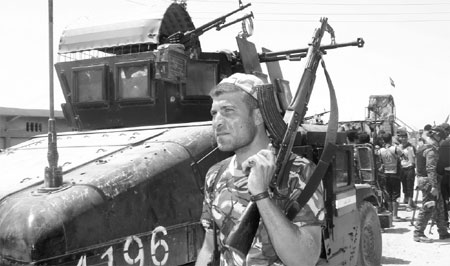Iraqi launches offensive in Tikrit
Baghdad says it has received Russian-made Su-25 fighter jets
Iraqi forces pressed their campaign to retake militant-held Tikrit on Sunday, clashing with Sunni insurgents nearby and pounding positions inside the city with airstrikes in their biggest counteroffensive so far.
A senior officer said on Saturday that security forces were coordinating with Washington, which has deployed military advisers to Iraq as it battles fighters from the Islamic State of Iraq and the Levant.
Armed US drones were flying over the city to provide protection for the advisers and other US personnel in their fight against the insurgents, who have captured territory in five provinces north and west of Baghdad.
Thousands of soldiers, backed by air cover, tanks and bomb disposal units, advanced on Tikrit - the hometown of executed dictator Saddam Hussein - which fell to insurgents on June 11.
Witnesses reported heavy clashes as troops moved in from the west.
"A large military operation started today to clear Tikrit of ISIL," Staff Lieutenant General Sabah Fatlawi told AFP on Saturday, giving ISIL fighters two choices - "flee or be killed".
Warplanes were targeting insurgents in the Tikrit area, Prime Minister Nuri al-Maliki's security spokesman said. Security forces also took control of a key road from Baghdad to Samarra, between the capital and Tikrit.
However, the BBC reported on Sunday that insurgents in Tikrit had so far managed to repel the assault, forcing government troops to withdraw to Dijla, 25 km south of the city. Heavy casualties were reported on both sides in Sunday's fighting.
US, Russian aircraft
US and Iraqi sources have confirmed the use of US aircraft over Iraq, but Maliki's government appears to be turning also to Russia for air power.
A senior US official, speaking on condition of anonymity, said "a few" armed drones were being used over Baghdad to safeguard Americans, but they will not be used for offensive action.
The Pentagon confirmed that among the manned and unmanned US aircraft carrying out surveillance over Iraq, some carried bombs and missiles.
Meanwhile, the Iraqi government said on Sunday it had taken delivery of several Russian fighter aircraft. Baghdad has agreed to buy more than a dozen Sukhoi warplanes from Russia and Belarus in a deal that could be worth up to $500 million.
The newly purchased Su-25 ground attack jets are expected to be pressed into service as soon as possible, bolstering Iraq's air power as it combats insurgents.
But it remains unclear who will fly them. Saddam Hussein's air force had Su-25s, but those pilots are unlikely to have had time in the aircraft in more than a decade.
Iraqi officials have voiced frustration that multibillion-dollar deals for US-made F-16s and Apache helicopters have not been expedited.
Political efforts
Top Shiite cleric Grand Ayatollah Ali al-Sistani, who is revered among Iraq's Shiite majority community, urged political leaders to unite and form a government quickly after the new parliament elected on April 30 convenes on Tuesday.
World leaders have insisted on a political settlement among Iraq's Shiite Arab, Sunni Arab and Kurdish communities.
Maliki, who has publicly focused on a military response to the crisis, has acknowledged that political measures are also necessary.
However, despite unity calls, Iraqi Kurdish leader Massud Barzani in particular has said Baghdad could no longer object to Kurdish self-rule in Kirkuk and other Kurdish areas from which federal forces withdrew as the insurgents advanced.
|
Iraqi security forces patrol after clashes with the predominantly Sunni militants in Dalli Abbas, Diyala province, on Saturday. On Sunday, government forces battled insurgents for control of Tikrit as part of a major counteroffensive north of Baghdad. Reuters |
(China Daily 06/30/2014 page11)















